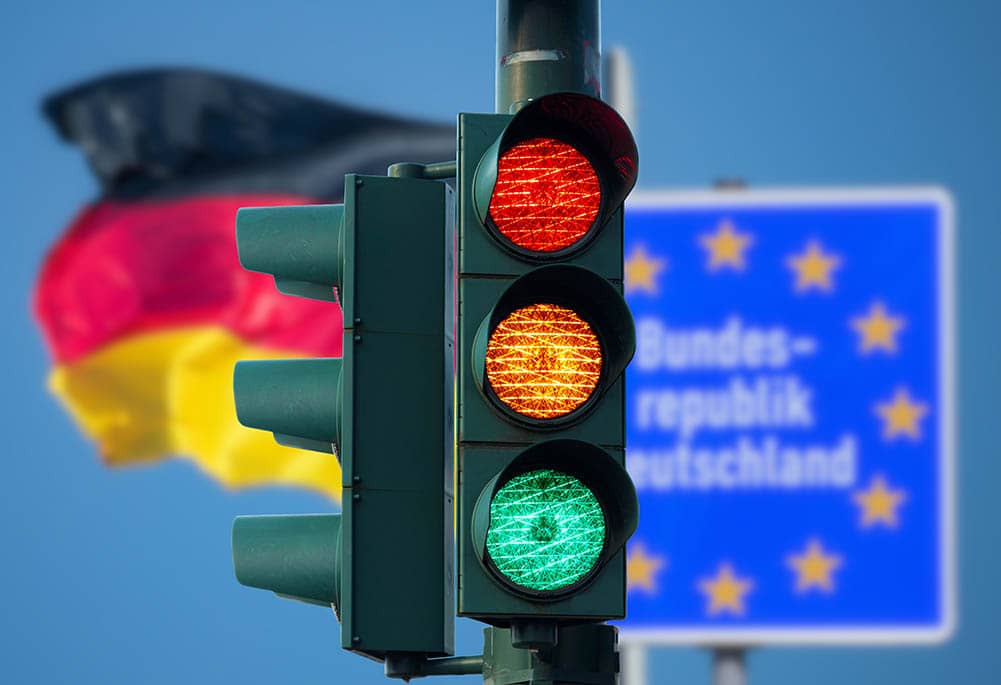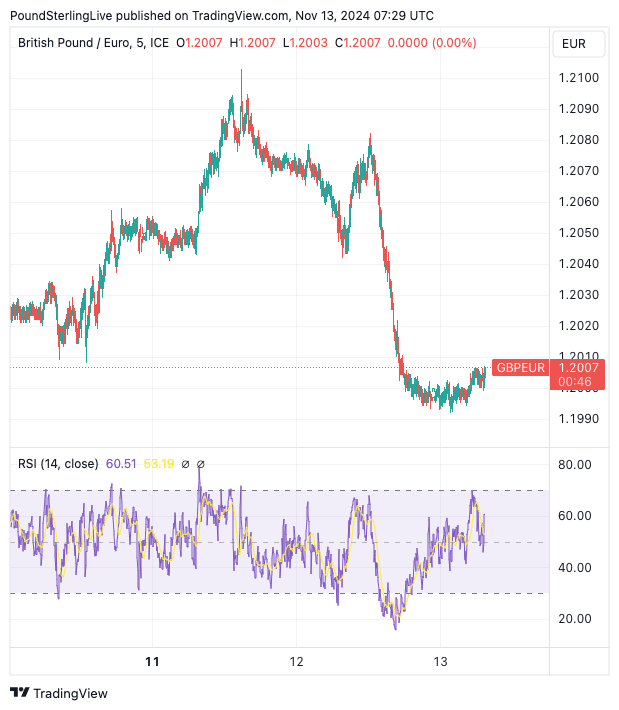
Image © Adobe Images
The pound to euro exchange rate (GBP/EUR) surged to 1.2103 on Monday amidst a frantic sell-off in the euro, but it has since fallen back to 1.20, having recorded a sizeable 0.65% daily drop on Tuesday.
Can the pound continue to rise against the euro, or has the rally stalled?
The uptrend in GBP/EUR remains intact on a multi-week timeframe, meaning the trend higher should remain intact, although near-term consolidation is likely to evolve.
We note that global equity markets had an 'off day' on Tuesday as the great 'Trump trade' surge hit the buffers.
GBP/EUR often has a strong correlation with global equity markets and broader investor sentiment, and the decline in stocks will have played a role in Tuesday's selloff.
This leaves us watching the bigger picture through the remainder of the week, as no domestic events in the UK will materially impact GBP exchange rates (Friday's GDP release will be of some interest but will not deliver lasting directional change).
It also appears that GBP/EUR's spike to 1.21 drew significant euro buying interest, which ultimately means that GBP/EUR faced significant selling pressure.
Big, round numbers have a strong attraction for GBP/EUR market participants, given this is understandable given this is the most important currency pair for the UK retail market (Brits who need to buy and sell euros).
Speculative traders will have been prepared for the rally to run into trouble at 1.21 and would have pressed the sell button on orders layered around this figure, anticipating the inevitable pullback, which they were rewarded with.
A look at the short-term five-minute chart shows that the Relative Strength Index (RSI, in the lower panel) became overbought around 1.21, justifying a pullback:
Some commentators say the wind direction turned against the Pound on Tuesday when UK labour market data showed a rise in the unemployment rate. However, we are not convinced this was the reason, as the labour market statistics will not have altered the path of interest rates at the Bank of England.
Although the labour market continues to weaken, wages are still too high, and inflationary projections have risen since the budget, meaning the Bank will likely continue cutting interest rates quarterly.
The Bank's Chief Economist Huw Pill alluded as such on Tuesday, saying, "as we saw in the labour market data that was released this morning, pay growth remains quite sticky at elevated levels."
Given the outlook for productivity growth in the UK, which is poor, Pill says wages are hard to reconcile with the UK inflation target.
"The BoE's Pill went back to his hawkish ways in a panel debate yesterday noting that the job is not done," says Jesper Fjärstedt, Senior Analyst at Danske Bank. "We continue to stay positive on GBP, targeting EUR/GBP at 0.81 in 6M."
EUR/GBP at 0.81 equates to 1.2345 in GBP/EUR.
In short, the fundamental picture for Pound Sterling has not altered between Monday and Wednesday.
The fundamentals are more interesting in the Eurozone, where political uncertainty in Germany and fears of a setback from U.S. trade tariffs are a concern.
Germany will go to the polls in February, meaning the country faces a winter of political uncertainty at a crucial time for Europe's biggest economy, which continues to struggle to find its feet.
Investor sentiment in the Eurozone and Germany fell notably in November, according to the ZEW survey, which showed a sharp retracement in readings on how investors perceive their current situation and the outlook.
The setback appears to largely be in response to Donald Trump’s election win and the prospect of U.S. tariffs, which are expected to hit Europe's already struggling manufacturing sector.
"While weakness was registered in both the current conditions and expectations components, the expectations component fell by more in both Germany and the euro area, underscoring that the negative economic impact from US tariffs will be felt only next year," says Andrzej Szczepaniak, an economist at Nomura.
The Euro will likely stay under pressure as markets anticipate a steady stream of interest rate cuts from the European Central Bank in response to a deteriorating outlook.

